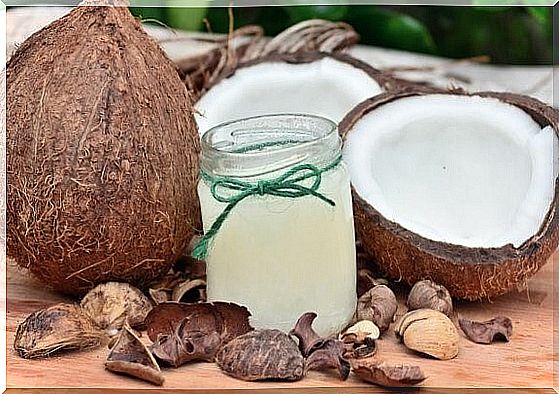Coconut Oil For Dogs: 3 Beneficial Properties

Coconut oil contains fats that can be beneficial for dogs. They improve digestion and the absorption of vitamins and minerals.
The benefits of coconut oil for dogs are many. It has a beneficial effect on your dog’s digestion and the health of his fur and skin. It can also prevent infections.
It is important to emphasize that if you are going to give your dog coconut oil, you must follow a professional’s instructions.
As with many other things, excess oil can have negative effects on your dog. However, a small amount can be beneficial for dog health.
The coconut, and especially coconut oil, is one of the few foods that have been classified as “superfoods”.
Superfoods are foods whose nutritional benefits are exponentially greater than those of other foods.
Coconut oil contains medium chain triglycerides (MCT), which are classified as healthy. Human and dog breast milk contains medium and long chain triglycerides. Because of this, coconut oil is particularly beneficial for human and dog health.
Medium chain triglycerides have antibacterial, antiviral, and antifungal properties. In addition, MCTs are easily metabolized by organisms. This improves digestion and the absorption of vitamins and minerals.

Benefits of coconut oil for dogs
Some of the beneficial properties for dogs include:
-
Fur and skin
It can help heal irritation and other skin conditions in your dog. Contact dermatitis and allergies caused by flies can be greatly reduced by using coconut oil.
In addition, it can reduce diseases like eczema and other rashes in a short period of time.
The smell characteristic of dogs is significantly reduced through the use of the oil.
When used on the fur, it makes brittle and dull fur supple and shiny again. Thanks to its antiseptic properties, it can also disinfect superficial wounds.
The oil makes the skin softer. Dogs’ paws and elbows are very dry areas that coconut oil can maintain. This is especially good for older dogs.
-
Digestion and metabolism
When ingested in small amounts, coconut oil is very beneficial for dogs’ digestion. It increases the absorption of nutrients in the digestive tract.
This means that all of the foods your dog eats in their diet are more beneficial to their organism.
The consumption of this oil also significantly reduces bad breath in dogs. It also removes any possible intestinal parasites that dogs may have.
Coconut oil can also reduce symptoms of colitis. It also regulates insulin levels. This means that it is less likely to develop diabetes.
In addition, the oil promotes regular thyroid function, which prevents hormonal disorders.
Because the metabolism is accelerated, consuming coconut oil will increase your dog’s energy. It helps reduce obesity in dogs for the same reason.
-
immune system
Coconut oil has antibacterial and antiviral properties. In addition, this oil also combats certain fungi and microbes, as well as parasites.
It strengthens the immune system and increases the dog’s defenses, so consuming it prevents infections and other diseases.
Some experts suggest that taking coconut oil can lower your risk of cancer and other chronic diseases. Arthritis and other inflammation are relieved by consumption.
Intake and amount
The exact amounts of coconut oil you can give a dog should be determined by a veterinarian. However, we can give you some advice. At the beginning the quantities have to be quite small.

Your dog’s organism needs time to get used to processing the oil. Because of this, if you give too much in the beginning, your dog may react negatively.
For small dogs and puppies, the amount should be around ¼ teaspoon for the first few days . For medium and large dogs, however, the amount should be ½ teaspoon.
If your dog is very small, like a Chihuahua or Yorkshire Terrier, the amount should be even less.
As your dog’s body gets used to the oil, you can increase the amounts. Note that the exact amount your dog should ingest should always be determined by your veterinarian.









